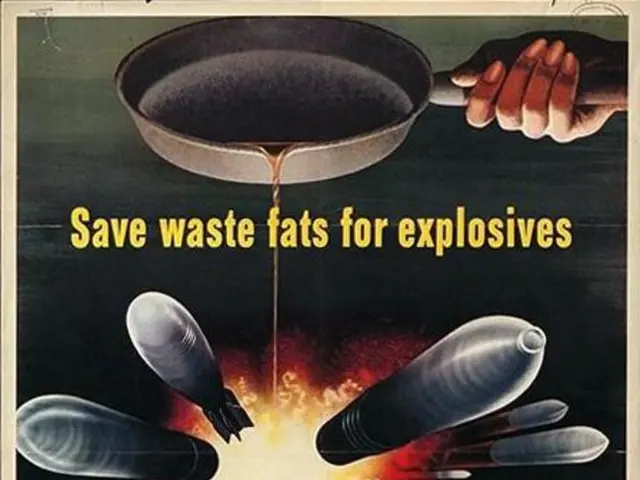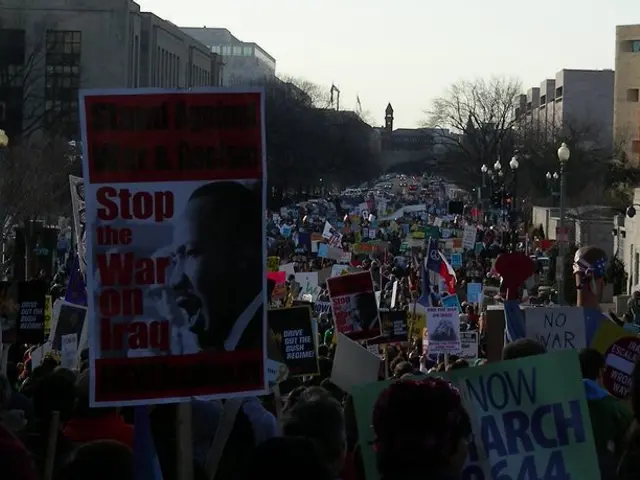TV Production Sector Faces Potential Chilling Impact Due to Proposed Trump Tariffs
Let's Discuss the Potential Chaos Ahead: Trump's Proposed Movie Tariffs and Their Impact on TV Production
In the last few days, the film and television industry has been abuzz with the potential consequences of Donald Trump's proposed 100% tariffs on imported films, primarily produced overseas. Although the focus has been on the theatrical industry, the consequences for TV production are equally noteworthy.
Tariffs, a Stormy Forecast for TV Production
Analyst Richard Greenfield, partner at Lightshed Partners, warned that the levies on overseas production would have a chilling impact on TV production as well. The uncertainty surrounding the proposal caused concerns among Hollywood executives and sent share prices for media giants like Netflix, Paramount Global, and Warner Bros. Discovery tumbling on Monday.
It's Complicated: Impact on TV and Streaming Services
Surprisingly, Donald Trump didn't mention TV or streaming services in his social media post proposing the tariffs. However, given the importance of television to the Hollywood studios, the possible impact on this sector cannot be overlooked. Even if the proposal is not expanded to TV programming, it could trigger retaliatory tariffs from foreign governments on U.S. content exports, denting the multibillion-dollar market for U.S. movies and TV.
Export Revenue, a Multibillion-Dollar Stake
In 2023, U.S. movie exports raked in $22.6 billion, creating a trade surplus of $15.3 billion. U.S. television exports are difficult to track, but shows like "Grey's Anatomy," "NCIS," "Law & Order," "The Simpsons," and many more generate significant international revenue. A 2013 study by the U.K. group Digital TV Research estimated that U.S. studios garnered $5.4 billion a year in selling drama series to European television.
Screenplay for Disruption
If the tariffs are imposed on both movies and TV, they would directly impact the budding economies of high-profile dramas. Many of these shows are partly produced outside the U.S. in countries like the U.K., Canada, and New Zealand. For instance, the first season of Amazon Prime's "Lord of the Rings: The Rings of Power" was filmed in New Zealand, later moving production to the U.K.
Today, high-profile TV productions rely heavily on international sales, often covering around half of their budgets from these markets. Netflix, Amazon Prime, and other major streamers have been leveraging their international footprints to fund dramas like "Rings of Power," which reportedly boasted a record-breaking $1 billion budget.
Dramatic Shift? Or a Simple Bluff?
Should the tariffs be applied to TV, they could upset the dynamics of the global television landscape, with profound consequences for both viewers and industry participants. But the extent to which the proposal is just a bluff, or whether it indicates a true shift in trade policy remains to be seen.
Sources:
[1] Lightshed Partners[2] The Hollywood Reporter[3] Variety[4] Deadline Hollywood
- The potential impact of Donald Trump's proposed 100% tariffs on imported films extends to television production as well.
- Analysts warn that the levies on overseas production could have a chilling effect on TV production, causing concerns among Hollywood executives.
- The tariffs were not explicitly mentioned for TV or streaming services in Trump's social media post, but the possible impact on this sector cannot be disregarded.
- U.S. television exports, including shows like "Grey's Anatomy," "NCIS," "Law & Order," and "The Simpsons," generate significant international revenue.
- If the tariffs are imposed on both movies and TV, they would impact the budgets of high-profile dramas, many of which are partly produced outside the U.S.
- High-profile TV productions rely heavily on international sales to cover a substantial portion of their budgets. Streamers like Netflix, Amazon Prime, and others fund dramas like "Lord of the Rings: The Rings of Power" with revenues from their international footprints.
- The imposition of tariffs on TV could upset the dynamics of the global television landscape, with repercussions for both viewers and industry participants.
- It remains unclear whether the proposed tariffs are a serious shift in trade policy or merely a bluff.
- The film and television industry is closely monitoring the tariff situation, with potential investments in the sector contingent upon the outcome.
- The NAB Show, a major event for media, entertainment, and technology professionals, will likely be a platform for discussing the implications of the tariffs on the broadcast and production industry.








